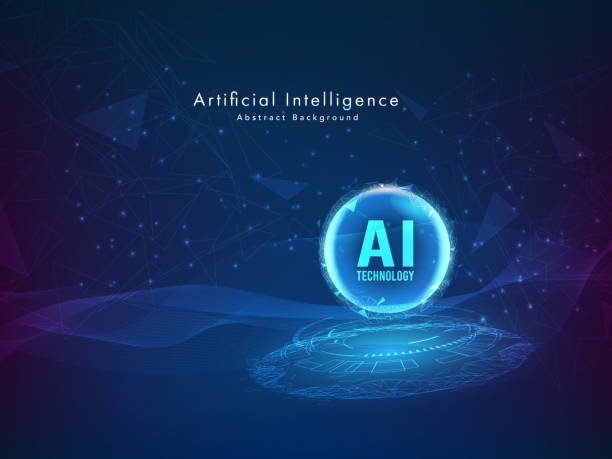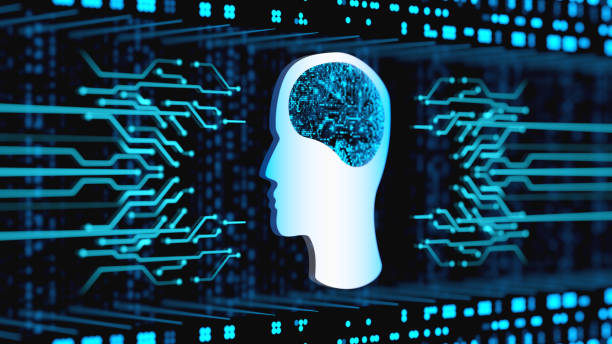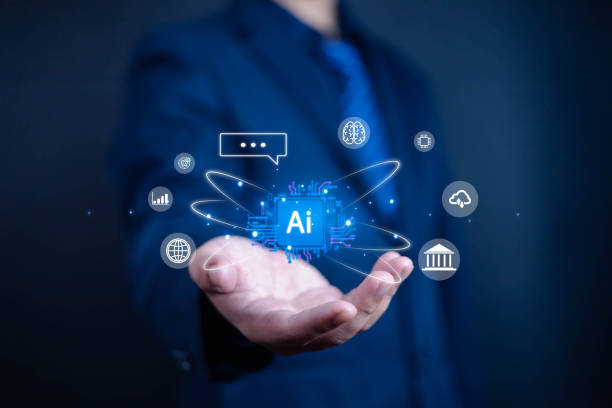What is Artificial Intelligence and What are its Applications?

#Artificial_Intelligence (AI) is a branch of computer science that deals with building machines capable of performing tasks that typically require human intelligence.
These tasks include learning, reasoning, problem-solving, understanding natural language, and seeing.
In other words, AI strives to design systems that can think and act like humans.
The applications of AI are very broad and diverse, having permeated almost all aspects of our lives.
Some of the most important applications of AI include:
- Medicine diagnosis of diseases, drug development, robotic surgery
- Transportation self-driving cars, traffic optimization
- Finance fraud detection, risk management, algorithmic trading
- Education personalized learning systems, automated assignment grading
- Manufacturing production line automation, quality control
- Customer Service chatbots, technical support
- Entertainment computer games, content creation
AI is rapidly advancing and is expected to play a much more significant role in our lives in the near future.
However, the development and use of AI also come with challenges that need to be addressed.
For more information on the definition of Artificial Intelligence, you can refer to Wikipedia.
Does your current website build the trust that potential customers should have in your business? If the answer is no, it’s time to get your professional and impactful corporate website with Rasav.
✅ Fully customized design tailored to your brand identity
✅ Increased lead generation and business credibility in the eyes of customers⚡ Contact us for a free consultation!
Machine Learning, the Beating Heart of Artificial Intelligence

Machine Learning is a subset of artificial intelligence that enables machines to learn from data without explicit programming.
In fact, machine learning allows machines to identify patterns and relationships within data and use these patterns for prediction or decision-making.
Machine learning is known as the beating heart of modern #Artificial_Intelligence.
There are various types of machine learning algorithms, each suitable for a specific kind of problem.
Some of the most important types of machine learning include:
- Supervised Learning In this type of learning, the machine is trained using labeled data (data where inputs and outputs are specified).
- Unsupervised Learning In this type of learning, the machine is trained using unlabeled data and must automatically discover patterns and structures within the data.
- Reinforcement Learning In this type of learning, the machine learns how to make the best decisions to achieve a specific goal by interacting with an environment.
Machine learning is used in various fields such as image recognition, natural language processing, stock market prediction, and product recommendation.
AI based on machine learning allows systems to continuously improve and optimize their performance.
Neural Networks, Inspired by the Human Brain

Neural Networks are computational models inspired by the structure and function of the human brain.
A neural network consists of many processing units called neurons, which are connected in layers.
Each neuron receives signals from other neurons, processes these signals, and produces an output signal.
Neural networks are very effective for solving complex problems such as image recognition, natural language processing, and machine translation.
Deep Neural Networks, which consist of many layers, have made significant advancements in the field of artificial intelligence in recent years.
Below is a table comparing different types of neural networks with their applications:
| Type of Neural Network | Application |
|---|---|
| Convolutional Neural Networks (CNN) | Image recognition, video processing |
| Recurrent Neural Networks (RNN) | Natural language processing, time series prediction |
| Generative Adversarial Networks (GAN) | Image generation, text generation |
AI, by utilizing these networks, is capable of solving complex problems and providing innovative solutions.
Natural Language Processing (NLP) and Machine Understanding of Human Language

Natural Language Processing is a branch of #Artificial_Intelligence that enables machines to understand human language and interact with it.
NLP includes a wide range of tasks such as machine translation, sentiment analysis, text summarization, and question answering.
Natural language processing plays a crucial role in the development of intelligent systems that can interact naturally with humans.
NLP algorithms use various techniques such as machine learning, neural networks, and statistical methods to understand and process human language.
These algorithms can extract information from text, identify relationships between words and phrases, and comprehend the overall meaning of a text.
The applications of NLP are very extensive and include the following:
- Chatbots Automated systems that can converse with users online.
- Machine translation Automatic translation of text from one language to another.
- Sentiment analysis Determining the emotions and attitudes expressed in a text.
- Text summarization Generating short and accurate summaries of long texts.
- Question answering Automatic answering of questions posed in natural language.
With recent advancements in NLP, intelligent systems that can understand human language and communicate with it have become increasingly powerful and practical.
These systems have the potential to fundamentally change how we interact with technology.
AI in this field provides new possibilities for communication and interaction.
Research shows that 80% of customers trust companies with a professional website more. Does your current site build this trust?
With Rasav’s corporate website design services, permanently solve the problem of customer distrust and a weak online image!
✅ Create a professional image and increase customer trust
✅ Attract more sales leads and grow your business
⚡ Get a free consultation
Computer Vision and the Ability of Computers to See

Computer Vision is a branch of #Artificial_Intelligence that enables machines to understand images and videos and extract information from them.
Computer Vision includes a wide range of tasks such as object detection, facial recognition, motion detection, and 3D reconstruction.
Computer Vision plays an important role in the development of intelligent systems that can understand and interact with their surrounding world.
Computer Vision algorithms use various techniques such as machine learning, neural networks, and image processing to understand and analyze images and videos.
These algorithms can detect objects in images, identify faces, track movements, and reconstruct 3D scenes.
The applications of Computer Vision are very extensive and include the following:
- Self-driving cars Detecting obstacles and traffic signs.
- Medical diagnosis Diagnosing diseases through medical images.
- Security Facial recognition for identifying individuals.
- Quality control Detecting defects in manufactured products.
- Robotics Guiding robots in complex environments.
With recent advancements in Computer Vision, intelligent systems that can understand images and videos and extract information from them have become increasingly powerful and practical.
These systems have the potential to fundamentally change how we interact with the physical world.
AI in this field brings about immense transformations.
Ethics in Artificial Intelligence, Challenges and Responsibilities

The development and use of Artificial Intelligence (AI) bring significant ethical challenges.
As #AI systems become more powerful, we must answer questions about how we can use them responsibly and ethically.
Ethics in Artificial Intelligence refers to a set of principles and values that must be observed in the design, development, and use of AI systems.
Some of the most important ethical challenges in Artificial Intelligence include:
- Bias AI systems may unintentionally be biased if trained with biased data.
- Privacy AI systems can collect and process a lot of personal information, which can compromise individuals’ privacy.
- Accountability When an AI system makes a mistake, it is difficult to determine who is responsible.
- Transparency Understanding how complex AI systems work is difficult, which can reduce trust in them.
- Job security AI-driven automation can lead to job losses.
To address these ethical challenges, we must consider ethical principles and standards in the design and development of AI systems.
Furthermore, we must ensure that these systems operate transparently and reliably, and that they are used responsibly and in line with societal interests.
AI requires attention to ethical issues and accountability.
Artificial Intelligence and the Future of Jobs

Artificial Intelligence (AI) is increasingly impacting the job market.
While some jobs may be lost due to AI-driven automation, #AI also creates new job opportunities.
Artificial Intelligence and the future of jobs is a topic that requires careful consideration and planning.
Some of the jobs most likely to be affected by automation include:
- Repetitive and routine jobs
- Office and administrative jobs
- Manufacturing jobs
However, AI also creates new job opportunities in the following areas:
- Development and maintenance of AI systems
- Data analysis and machine learning
- AI ethics and accountability
Below is a table showing some at-risk jobs and new jobs resulting from AI:
| At-Risk Jobs | New Jobs |
|---|---|
| Machine operator | AI engineer |
| Data entry clerk | Data analyst |
| Accountant | AI ethics specialist |
To prepare for the future of jobs, we must acquire new skills that complement AI.
These skills include critical thinking, problem-solving, creativity, and communication skills.
AI necessitates adapting to changes in the job market.
Investing in Artificial Intelligence, Opportunities and Challenges

Investing in Artificial Intelligence (AI) is a great opportunity for economic growth and innovation.
However, investing in this field also brings challenges that need to be addressed.
Investing in AI requires a thorough understanding of the potentials and risks of this technology.
Some of the investment opportunities in Artificial Intelligence include:
- AI startups and emerging companies
- Large technology companies active in AI
- Venture capital funds that invest in AI companies
- Research and development in AI
Some of the challenges of investing in Artificial Intelligence include:
- High investment risk in startups
- Need for technical expertise to evaluate AI projects
- Rapid changes in AI technology
For successful investment in Artificial Intelligence, one must conduct thorough research, consult with experts, and choose an appropriate investment strategy.
AI provides many investment opportunities.
Do you dream of a thriving online store but don’t know where to start?
Rasav is your comprehensive e-commerce website design solution.
✅ Attractive and user-friendly design
✅ Increased sales and revenue⚡ Get a free consultation
Artificial Intelligence in Iran, Current Status and Future Outlook

Artificial Intelligence (AI) has also gained attention as an important technology in Iran.
The government and private sector are investing in the development and use of AI in various fields.
The current status of AI in Iran indicates that the country has high potential to become a regional hub in this area.
Some important activities in the field of Artificial Intelligence in Iran include:
- Development of machine learning algorithms
- Persian natural language processing
- Computer vision for various applications
- Robotics and automation
Challenges facing the development of Artificial Intelligence in Iran include:
- Shortage of skilled workforce
- Limitations in data access
- Lack of investment
Despite these challenges, Iran has high potential to become a significant player in the field of Artificial Intelligence.
With proper investment and attention to education and human resource development, this potential can be realized.
AI in Iran has a bright future ahead.
The Future of Artificial Intelligence, Visions of Tomorrow’s World
![]()
The future of Artificial Intelligence (AI) is full of potential and possibilities.
Our visions of tomorrow’s world will significantly change with the advancement of #AI.
The future of Artificial Intelligence will completely impact how we live, work, and interact with our surroundings.
Some visions of tomorrow’s world with Artificial Intelligence include:
- Self-driving cars that will completely revolutionize transportation
- Intelligent robots that will assist us in homes and workplaces
- Medical systems that can accurately diagnose and treat diseases
- Educational systems that provide personalized learning to each individual
- A world where many repetitive and tedious tasks are performed by machines
However, attention must also be paid to the ethical and social challenges arising from the advancement of Artificial Intelligence.
We must ensure that this technology is developed responsibly and in line with societal interests.
AI is the key to a better future for all of us.
Artificial Intelligence is rapidly evolving and continuously learning and improving.
These advancements can lead to massive transformations in our lives.
AI is a powerful tool for solving problems and creating new opportunities.
Frequently Asked Questions
| Question | Answer |
|---|---|
| 1. What is Artificial Intelligence (AI)? | It is a branch of computer science that aims to create machines capable of simulating human intelligence and performing tasks that require human thinking, such as learning, problem-solving, and decision-making. |
| 2. What are the main types of Artificial Intelligence? | It can be classified into Narrow AI, which focuses on a specific task, General AI, which possesses comprehensive human capabilities, and Super AI, which surpasses human intelligence. |
| 3. Mention some common applications of Artificial Intelligence in our daily lives. | These include voice assistants (like Siri and Alexa), recommendation systems (like Netflix and Amazon), self-driving cars, facial recognition systems, and spam filters. |
| 4. What is the difference between Artificial Intelligence and Machine Learning? | Artificial Intelligence is the broader concept of creating intelligent machines, while Machine Learning is a subset of AI that focuses on enabling systems to learn from data without explicit programming. |
| 5. What is Deep Learning? | It is a subset of Machine Learning that uses multi-layered artificial neural networks (deep neural networks) to process data and discover complex patterns, and it is used in image and speech recognition. |
| 6. What are the main benefits of Artificial Intelligence? | Improving efficiency and productivity, automating repetitive tasks, making better decisions based on big data analysis, and developing solutions for complex problems in fields such as medicine and science. |
| 7. What are the main challenges facing the development and deployment of Artificial Intelligence? | These include the need for huge amounts of high-quality data, privacy and security issues, bias in data and algorithms, and high development and maintenance costs. |
| 8. Does Artificial Intelligence raise ethical or social concerns? | Yes, it raises concerns related to privacy, algorithmic bias, job displacement due to automation, accountability for errors made by intelligent systems, and the need for a regulatory framework. |
| 9. How can Artificial Intelligence affect the future of the job market? | It can lead to the automation of some routine jobs, but it will also create new jobs requiring advanced skills in the development, operation, and maintenance of AI systems. |
| 10. What are some modern or promising technologies in the field of Artificial Intelligence? | These include advanced Natural Language Processing (NLP) (such as large language models like ChatGPT), computer vision, robotics, and Generative AI. |
And other advertising agency services from Rasav in the field of advertising
- Smart Content Strategy: A novel service to enhance campaign management through key page optimization.
- Smart Digital Branding: An effective tool for online growth with attractive UI design.
- Smart UI/UX: Designed for businesses seeking to increase click-through rates through marketing automation.
- Smart Google Ads: A creative platform to improve sales growth with attractive UI design.
- Smart Sales Automation: A combination of creativity and technology for user engagement through Google ad management.
And over hundreds of other services in the areas of internet advertising, advertising consultation, and organizational solutions.
Internet Advertising | Advertising Strategy | Advertorials
Sources
Artificial Intelligence: A Gateway to an Amazing and Challenging Future
What is Artificial Intelligence?
Artificial Intelligence Developments
Artificial Intelligence: Its Challenges and Opportunities
In today’s highly competitive world, your powerful online presence finds meaning with Rasav Afarin. We are here to help your business reach its peak with our expertise in user-friendly website design, SEO, and digital marketing. To start a digital transformation, contact us today.
📍 Tehran, Mirdamad Street, next to the Central Bank, South Kazeroon Alley, Ramin Alley, No. 6




